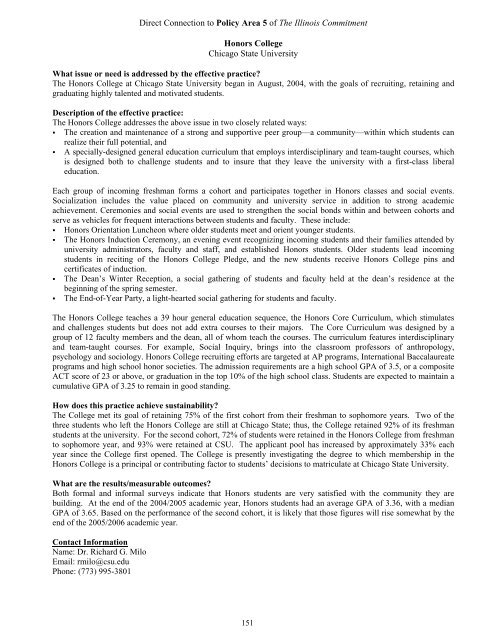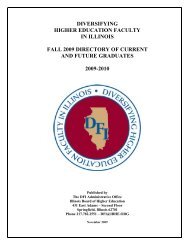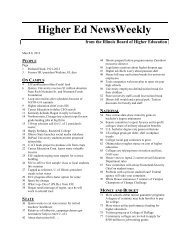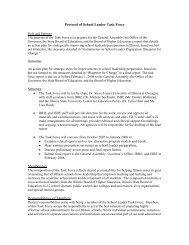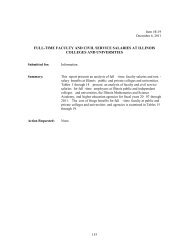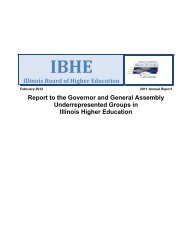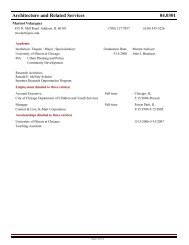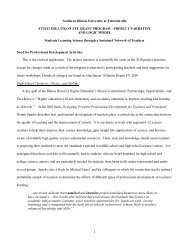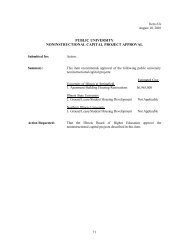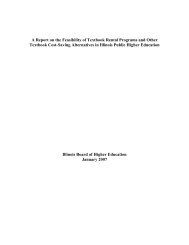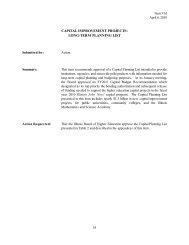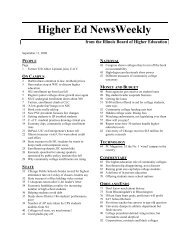Title of Effective Practice: - California Postsecondary Education ...
Title of Effective Practice: - California Postsecondary Education ...
Title of Effective Practice: - California Postsecondary Education ...
Create successful ePaper yourself
Turn your PDF publications into a flip-book with our unique Google optimized e-Paper software.
Direct Connection to Policy Area 5 <strong>of</strong> The Illinois Commitment<br />
Honors College<br />
Chicago State University<br />
What issue or need is addressed by the effective practice?<br />
The Honors College at Chicago State University began in August, 2004, with the goals <strong>of</strong> recruiting, retaining and<br />
graduating highly talented and motivated students.<br />
Description <strong>of</strong> the effective practice:<br />
The Honors College addresses the above issue in two closely related ways:<br />
• The creation and maintenance <strong>of</strong> a strong and supportive peer group—a community—within which students can<br />
realize their full potential, and<br />
• A specially-designed general education curriculum that employs interdisciplinary and team-taught courses, which<br />
is designed both to challenge students and to insure that they leave the university with a first-class liberal<br />
education.<br />
Each group <strong>of</strong> incoming freshman forms a cohort and participates together in Honors classes and social events.<br />
Socialization includes the value placed on community and university service in addition to strong academic<br />
achievement. Ceremonies and social events are used to strengthen the social bonds within and between cohorts and<br />
serve as vehicles for frequent interactions between students and faculty. These include:<br />
• Honors Orientation Luncheon where older students meet and orient younger students.<br />
• The Honors Induction Ceremony, an evening event recognizing incoming students and their families attended by<br />
university administrators, faculty and staff, and established Honors students. Older students lead incoming<br />
students in reciting <strong>of</strong> the Honors College Pledge, and the new students receive Honors College pins and<br />
certificates <strong>of</strong> induction.<br />
• The Dean’s Winter Reception, a social gathering <strong>of</strong> students and faculty held at the dean’s residence at the<br />
beginning <strong>of</strong> the spring semester.<br />
• The End-<strong>of</strong>-Year Party, a light-hearted social gathering for students and faculty.<br />
The Honors College teaches a 39 hour general education sequence, the Honors Core Curriculum, which stimulates<br />
and challenges students but does not add extra courses to their majors. The Core Curriculum was designed by a<br />
group <strong>of</strong> 12 faculty members and the dean, all <strong>of</strong> whom teach the courses. The curriculum features interdisciplinary<br />
and team-taught courses. For example, Social Inquiry, brings into the classroom pr<strong>of</strong>essors <strong>of</strong> anthropology,<br />
psychology and sociology. Honors College recruiting efforts are targeted at AP programs, International Baccalaureate<br />
programs and high school honor societies. The admission requirements are a high school GPA <strong>of</strong> 3.5, or a composite<br />
ACT score <strong>of</strong> 23 or above, or graduation in the top 10% <strong>of</strong> the high school class. Students are expected to maintain a<br />
cumulative GPA <strong>of</strong> 3.25 to remain in good standing.<br />
How does this practice achieve sustainability?<br />
The College met its goal <strong>of</strong> retaining 75% <strong>of</strong> the first cohort from their freshman to sophomore years. Two <strong>of</strong> the<br />
three students who left the Honors College are still at Chicago State; thus, the College retained 92% <strong>of</strong> its freshman<br />
students at the university. For the second cohort, 72% <strong>of</strong> students were retained in the Honors College from freshman<br />
to sophomore year, and 93% were retained at CSU. The applicant pool has increased by approximately 33% each<br />
year since the College first opened. The College is presently investigating the degree to which membership in the<br />
Honors College is a principal or contributing factor to students’ decisions to matriculate at Chicago State University.<br />
What are the results/measurable outcomes?<br />
Both formal and informal surveys indicate that Honors students are very satisfied with the community they are<br />
building. At the end <strong>of</strong> the 2004/2005 academic year, Honors students had an average GPA <strong>of</strong> 3.36, with a median<br />
GPA <strong>of</strong> 3.65. Based on the performance <strong>of</strong> the second cohort, it is likely that those figures will rise somewhat by the<br />
end <strong>of</strong> the 2005/2006 academic year.<br />
Contact Information<br />
Name: Dr. Richard G. Milo<br />
Email: rmilo@csu.edu<br />
Phone: (773) 995-3801<br />
151


